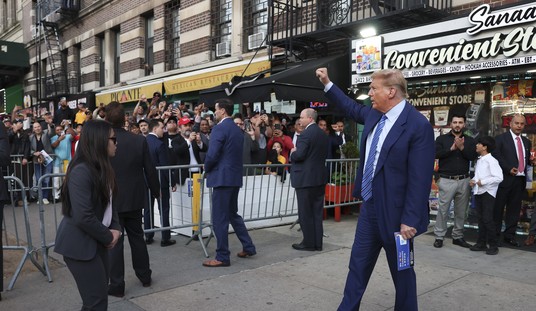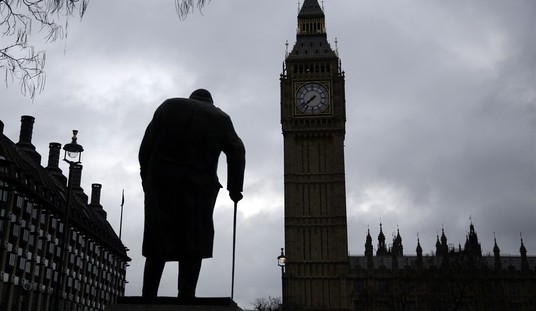The adjective “iconic” is criminally overused, particularly by enthusiastic but historically illiterate youngsters.
However, for many old fogeys, the photograph above actually deserves that designation.
Just check out that badass Rasta, striding fearlessly, even casually, toward a line of (probably) white London cops.
He’s alone, but this is his neighborhood, not theirs, so why should he cower, despite the menace hovering in the air?
Surely something has exploded, gone horribly, fatally wrong — or is just about to — beyond the frozen boundaries of this picture, which seems to be holding its breath, like an enjambed line of poetry.
Although this photo was taken in 1976, it seems weirdly timeless, yet timely, especially in the wake of Ferguson.
And it is, except not for the reason one might expect.
In 2004, when he was still fashionable enough to score such assignments, filmmaker Michael Moore wrote an op-ed for the Los Angeles Times, “celebrating” the Fourth of July:
Those who absconded with our flag now use it as a weapon against those who question America’s course. They remind me of that famous 1976 photo of an anti-busing demonstrator in Boston thrusting a large American flag on a pole into the stomach of the first black man he encountered.
That same day, essayist James Lileks picked apart Moore’s mediocre editorial, and paid particular attention to that paragraph.
“That could be what’s happening here,” Lileks wrote, linking to Stanley Forman’s famous Pulitzer Prize photo, above, “although whether this is ‘the first black man he encountered’ isn’t clear from the picture.”
That’s not all that wasn’t “clear from the picture.”
Lileks continued:
Interesting side note: the man who was being attacked was named Ted Landsmark. He spent part of his youth in Harlem. He later went on to Yale, to get a BA in Political Science, then got a PhD at Boston U. He is presently the president and CEO of the Boston Architectural Center, and has received fellowships from the National Science Foundation. (The Bush administration requested a three percent increase in their funding in the last budget.) The man in the photo wielding the flag was Joseph Rakes, who when last heard from was a laborer on the Big Dig in Boston. Ted Landsmark is writing opinion pieces for the Globe about the nature of the art and landscaping that will go on top of the tunnel.
What a horrible country, eh?
Oh, and five years after Lileks posted that essay, Landsmark wrote a particularly memorable op-ed for the Globe.
It was called: “It’s time to end busing in Boston.”
“If I feel physically as if the top of my head were taken off,” Emily Dickinson told one correspondent. “I know that is poetry.”
That’s how I felt after reading James Lileks’ July 4, 2004 blog post about Moore, Landsmark and Rakes.
In a single paragraph, Lileks punctured decades of smug elite “progressive” mythologizing.
No, not everybody who needed to read his post ever saw it, but I did.
I’d already been busily “puncturing” leftist fables, but Lileks inspired me to redouble my efforts.
In a weird way, so did Don Letts.
Letts and Lileks couldn’t be more different.
London-born, of Jamaican descent, Letts as a youth devoured the writings of Marcus Garvey and other African-American radicals.
Yet instead of turning an angry black separatist, Letts became one of the pioneers of an otherwise very white musical, cultural and political movement: punk.
By playing then-exotic Jamaican dub in his funky shop, Acme Attractions (and then at the first punk club, The Roxy, as a DJ), Letts’s record collection single-handedly injected the reggae sound into the punk scene.
Among many other things, Letts also managed The Slits, directed some of the first music videos, and served as The Clash’s official filmmaker. (His 2003 documentary about the band, Westway to the World, won a Grammy.)
Even if you don’t recognize his name, you might have seen Don Letts before:
That’s him strolling in front of that line of British bobbies.
When that photo was chosen as the cover of the 1977 Black Market Clash EP, Letts became cool defiance personified to hundreds of thousands of (mostly white) kids.
The image of Don is immortalized on the ‘Black Market Clash’ compilation. The picture is taken in 1976 at Notting Hill just as the riots are about to erupt. It is such a confrontational image, yet according to Don that is deceptive.
“It’s me in front of 500 cops. Behind me all of the brothers are getting bricked up and bottled up ready to launch into the cops. I decide that I’d better step aside.
“That’s all I was doing, crossing the street.”
In his new book, The Un-Civil War, African-American author Taleeb Starkes pinpoints “cultural conformity” as the first thing he would change about his community, if he had the power.
Indeed, as I’ve written elsewhere, African-American fashion and music — and, as a result, thinking, voting and living — is weirdly frozen in time, and this lockstep uniformity is strictly enforced.
Have you ever noticed that, within the black community, pop subcultures such as whites (and certain nonwhites, like the Japanese) conceive of them do not exist?
Think about it: except for Rastas, there are no African-American equivalents to the beatniks and goths, mods and rockers, skins and Teds, punks and new romantics, hippies and hipsters or (God help us) Juggalos. (…)
To cite the subculture I’m most familiar with, the total number of well-known black punks fits comfortably into, well, one 66-minute film. (Directed by a half-white guy.)
Imagine that the vast majority of white Americans of all ages and classes dressed as Teddy boys, that virtually the only music on the radio was rockabilly—and that this had been the case since 1958.
Yet such an absurd scenario lines up perfectly with the creepily clone-like African-American culture of today.
When Don Letts stepped beyond the boundaries of his British-Caribbean culture, he was embraced by his new white friends.
Patti Smith dragged him on stage (with amusing results).
He toured America with the Sex Pistols, and the world with the Clash, later joining Mick Jones’ post-Clash group Big Audio Dynamite on keyboards (although he admits that he still puts stickers on the keys to tell the notes apart).
Letts’ “brederin,” however, weren’t always so open-hearted.
Reggae star Peter Tosh condemned the Clash as “heathens” and “barbarians” and accused them of stealing his equipment during a gig in Kingston, to cite just one anecdote.
As Letts writes in his memoirs:
[W]hen Bob Marley was staying in Oakley Street off the King’s Road after he had been shot in Jamaica, I went round to his house to collect some money he owed me wearing my bondage trousers. He was to all intents and purposes in exile over here and we ended up having an argument about punk.
On seeing my bondage trousers, he exclaimed, “What ya deal wid Don Letts dem nasty punk rockers, yu look like a bloodclaat mountaineer!” To which I replied, “Dem crazy baldheads are my mates Bob”—or words to that effect and took my leave.
But y’know I always figured I got the last say because when Bob became more familiar with the real deal (as opposed to the Daily Mirror version of punk) during his UK stay, he was inspired to write and record the tune “Punky Reggae Party” a few months later.
Don Letts is unapologetic about his friends, his influences and his tastes.
He doesn’t seem to ask “Is it black?” so much as “Is it good? Do I like it?”
It sounds elementary, but within a black culture crippled by its cookie-cutter “urban” aesthetic, such a stance is revolutionary.
“I have a natural resistance to being labelled or categorized,” Letts told one interviewer.
“All my life I’ve railed and kicked against dogma and rhetoric. I’ve stuck my neck out. I’m the rebel dread.”










Join the conversation as a VIP Member